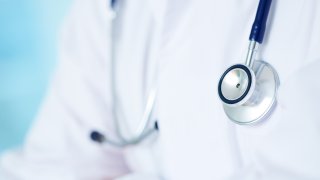
UC San Diego students who have received the Moderna COVID-19 vaccine will be among those participating in a study that seeks to evaluate infection and transmission of the virus among college students, it was announced on Monday.
The COVID-19 Prevention Network, headquartered at Seattle's Fred Hutchinson Cancer Research Center, will launch the trial study, Prevent COVID U, on Friday.
The trial is funded by the Federal COVID-19 Response Program and the National Institute of Allergy and Infectious Diseases. It is intended to determine if the mRNA-1273 vaccine, currently authorized for emergency use by the U.S. Food and Drug Administration, can prevent infection with SARS-CoV-2 -- including asymptomatic infection -- and reduce transmission of the virus from vaccinated persons to their close contacts.
"The new trial will tell us whether a person can become infected after they've been vaccinated and if the vaccine will stop the virus from spreading person-to-person," said Dr. Larry Corey, principal investigator of CoVPN's operations program, professor at Fred Hutchinson Cancer Research Center and one of the study leaders. "The answers to these questions have implications for public health and will allow us to make more science-based decisions about mask use and social distancing post-vaccination -- especially when new variants are emerging."
Get San Diego local news, weather forecasts, sports and lifestyle stories to your inbox. Sign up for NBC San Diego newsletters.
Investigators will enroll approximately 12,000 college students aged 18-26 years at more than 20 universities across the U.S. -- including UCSD -- and follow them over a five-month period.
Large numbers of SARS-CoV-2 infections have been reported on campuses throughout the U.S. A nationwide survey found that more than 397,000 infections were counted at 1,800-plus universities after reopening in the fall of 2020.
Studies in the CDC's Morbidity and Mortality Weekly Report last October reported that SARS-CoV-2 infections among young people aged 18-22 increased 55% nationally between August and September 2020. Between June and August 2020, young people aged 20-29 had the highest incidence of SARS-CoV-2 infection in the U.S. -- accounting for more than 20% of all confirmed cases.
Local
"High-density housing, the impulse to socialize and less fear of severe disease in young people are all factors that contribute to the high burden of SARS-CoV-2 infection on college campuses," said Dr. Holly Janes, a professor at Fred Hutchinson Cancer Research Center and one of the leaders of the study.
Half of the students will be randomly selected to receive the vaccine right away at enrollment, while the other half will get the vaccine four months later. All participants will know which arm of the trial they are in at enrollment and all will ultimately receive the vaccine. Throughout the study period, participants will complete questionnaires via an eDiary app, swab their nose daily for COVID-19 infection and provide periodic blood samples.
Because testing the vaccine's effectiveness to reduce and prevent transmission requires measuring spread of the virus to others, about 25,500 individuals identified by participants in the main study as "close contacts" also will be invited to take part in the trial. Close contacts who have agreed to participate in the study will be asked to answer weekly questionnaires, provide two blood samples and take daily swabs of their nose for two weeks.
UCSD students interested in participating can click here for more information.



